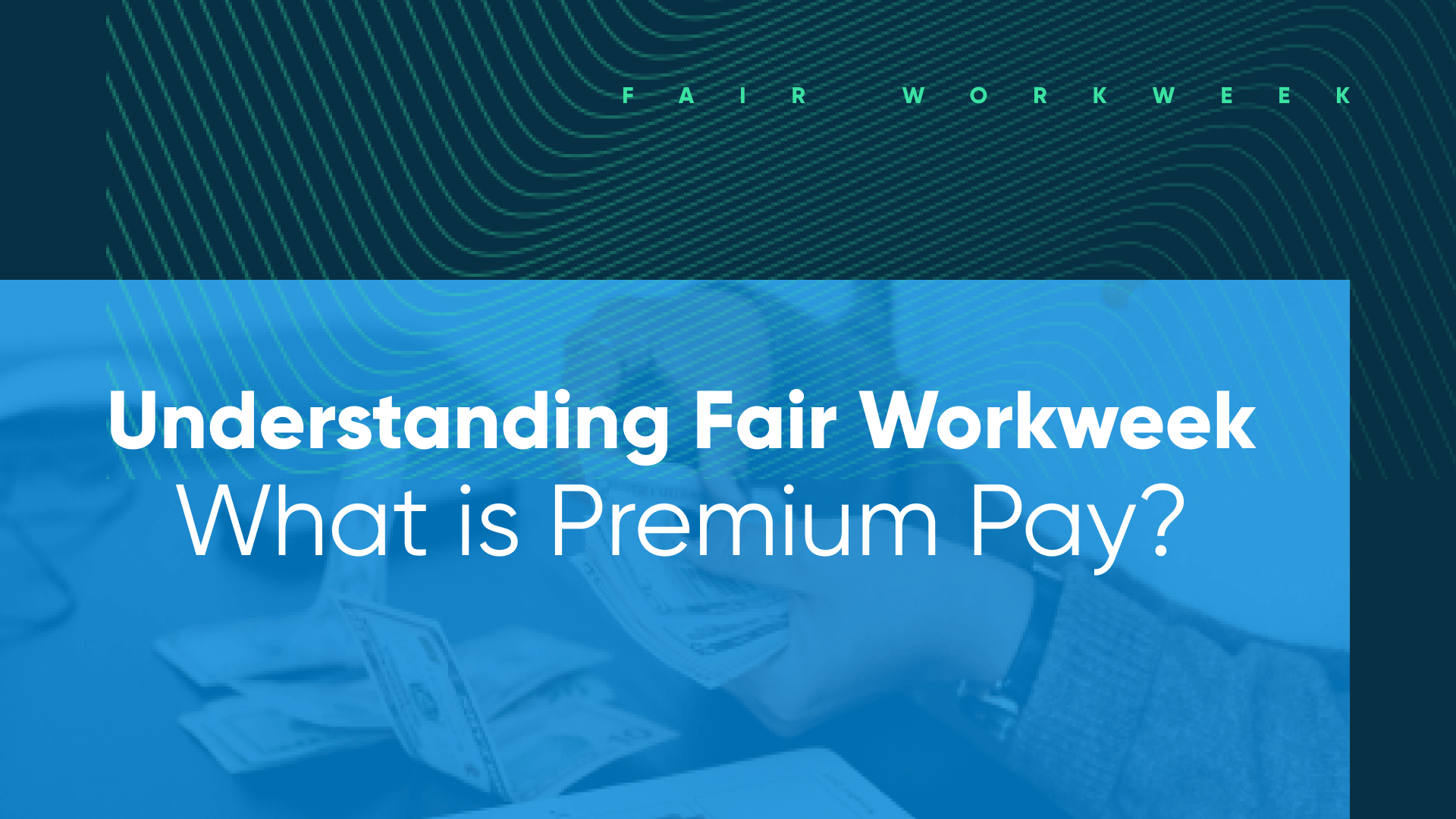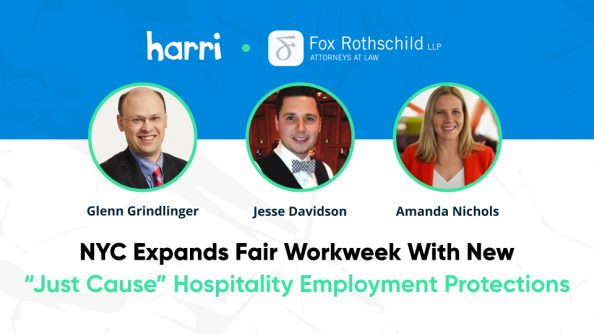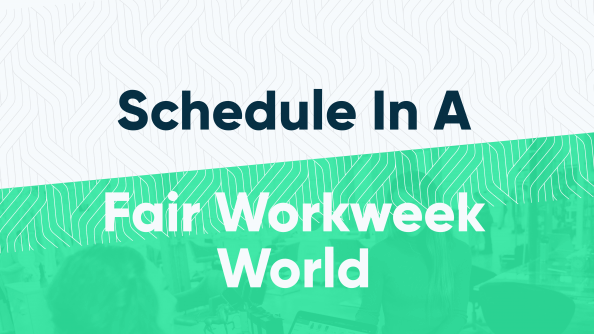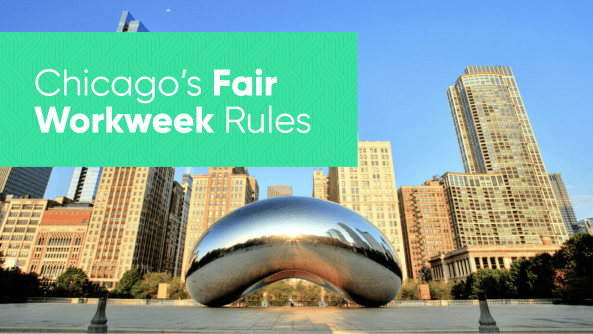Understanding Fair Workweek: What is Premium Pay?

- By Harri Insider Team | December 16, 2020
Fair Workweek and its many rules have been a challenge for restaurant and hospitality businesses across the country. Complying with these laws has grown more challenging amidst an evolving legal and regulatory landscape. So what can you do to ensure your business complies with Fair Workweek requirements and avoids associated premium penalties? Premium Pay, also known as “predictability pay” or “schedule change premiums,” is additional compensation required by Fair Workweek laws. In this article, we’re reviewing critical information operators need to know about these requirements and providing insight into how intelligent scheduling tools can help businesses navigate these challenges.
What is Fair Workweek premium pay or predictability pay?
Premium pay is a penalty that an employer pays to employees in addition to their earned wages. Under Fair Workweek, premium pay is required as compensation when an employer initiates last-minute changes to an employee’s work schedule, fails to notify an employee of their upcoming work shifts in advance, or they violate right-to-rest rules.
Last-minute scheduling actions that may result in premium payments include:
- Canceling shifts
- Changing the location where a shift will be worked
- Changing the shift’s day, start or end time, or duration
- Adding a shift or additional hours to an existing shift
Are there exceptions to Fair Workweek premium payments?
In some cases, there may be exceptions where you may not be required to pay a Fair Workweek premium payment.
Some exceptions to Predictability Pay may include:
- Small-time changes (usually less than 15 minutes)
- The employee initiates a schedule change
- Employees initiate shift swaps with other team members (not initiated by management)
- Unforeseen circumstances keep the business from functioning normally (natural disasters, power outages, break-ins, etc)
However, please be aware each Fair Workweek jurisdiction has unique, legally specified premium payment exceptions.
How much do Fair Workweek premium payments cost?
Premium payments can be costly. The premium payment amount varies based on the city or state of the business location. The conditions that require employers to pay premium payments also vary depending on location. The duration of notice and type of schedule change determine the amount of premium payment owed to the employee.
In New York City, for example, Premium Pay would occur when there is an addition of hours, a subtraction of hours, a schedule change with no loss of hours, or a scheduled right-to-rest violation. Employee consent is required when there is a scheduled right-to-rest violation, or the employer adds hours to the employee’s schedule following the advance notice period. It is also worth noting that some Fair Workweek Ordinances mandate certain requirements such as providing a “good faith estimate” of work schedules upon hiring.
Fair Workweek premium pay breakdown
Premium payments in other cities look slightly different. In general, the closer to the shift changes are made, the greater Premium Pay employers will be required to pay.
Below are a few example city-wide breakdowns to show how Fair Workweek premiums may affect a business.
New York City Premium Pay
Any schedule changes made with less than 14 days’ notice, but more than 7 days’ notice:
$10-$20 per change
Any schedule changes made with less than 7 days’ notice, but more than 24 hours’ notice:
$15-$45 per change
Any schedule changes with less than 24 hours’ notice:
$15-$75 per change
Philadelphia Premium Pay
Adding hours:
Pay one hour at the employee’s regular rate of pay
For subtracting hours:
Pay half the regular hourly rate for hours subtracted
Canceling shifts:
Pay half the regular hourly rate for hours lost
Chicago Premium Pay
Adding hours:
Pay one hour of predictability pay at employees’ regular rate of pay
Subtracting hours:
Pay one hour of predictability pay (more than 24 hours’ notice), or at least 1.5x the employee’s regular hourly rate for subtracted hours (less than 24 hours).
San Francisco Premium Pay
Any schedule changes made with less than 7 days notice, but more than 24 hours notice:
Pay one hour at the employee’s regular rate of pay.
Any schedule changes made with less than 24 hours’ notice:
Pay two hours of premium pay at the employee’s regular rate of pay for shifts 4 hours or less.
Pay four hours of premium pay at the employee’s regular rate of pay for shifts more than 4 hours.
Seattle Premium Pay
Adding hours, or changing the start/end time or day with no loss of hours:
Pay one hour at the employee’s scheduled rate of pay.
Subtracting hours:
Pay no less than half the scheduled rate of pay for hours subtracted
On-call hours but the employee is not called in:
Pay half of the hours not worked at the scheduled rate of pay.
How to reduce Fair Workweek premium payment costs
An all-in-one compliance platform is the best way to work towards labor efficiency while navigating complex Fair Workweek premium payments. Operators should look for a tool that doesn’t just attempt to reduce Fair Workweek premium payments but also helps them to understand which payments are necessary (such as in the case of understaffing) and which are avoidable.
Harri is the only hospitality-focused compliance platform built specifically to tackle labor challenges associated with Fair Workweek compliance.
- Data-driven scheduling with built-in compliance at the federal and local levels
- Non-compliance alerts and warnings to reduce accidental premium payments
- Granular Fair Workweek reports to understand exactly when premiums were paid, to whom, how much, and why
Learn how Harri optimizes Fair Workweek compliance strategies while improving premium payment visibility across entire hospitality chains.
Premium Pay and Fair Workweek: Benefits of Compliance Beyond Cost-Savings
Compliance with Fair Workweek laws extends far beyond just avoiding penalties and managing costs. One of the most significant benefits is the positive impact on company culture and employee satisfaction. Predictable scheduling under these laws allows employees to have a greater sense of control over their work-life balance. This predictability can lead to increased job satisfaction, as employees are better able to plan their personal lives and commitments around a stable work schedule.
Moreover, companies that demonstrate a commitment to Fair Workweek compliance often see improved employee morale. Employees tend to value employers who respect their time and personal lives, fostering a sense of loyalty and decreasing turnover rates. High levels of employee engagement and satisfaction can translate into higher productivity and better customer service, directly benefiting the business’s bottom line.
Strategies for Efficient Premium and Predictability Pay Compliance
conducting a thorough audit of current scheduling practices is crucial. This audit should identify areas where the business may not be fully compliant and provide a foundation for developing a more effective scheduling system.
Training for managers and supervisors is another essential strategy. They should be well-versed in the specifics of Fair Workweek laws and understand how to implement compliant scheduling practices. This training should cover how to handle scheduling changes, manage employee scheduling requests, and the importance of maintaining accurate scheduling records.
Involving employees in the scheduling process can also be beneficial. Providing a platform for employees to communicate their availability and scheduling preferences, like Harri, can help create schedules that work for both the business and its employees, reducing the need for last-minute changes that could incur premium pay.
Finally, developing a set of best practices for scheduling within the framework of Fair Workweek laws is crucial. These practices should prioritize advance scheduling, minimize last-minute changes, and ensure that all employees are treated fairly and consistently.
Technology's Role in Simplifying Compliance
Technology plays a pivotal role in simplifying compliance with Fair Workweek laws. Predictive scheduling and compliance-focused Human Capital Management (HCM) platforms like Harri offer several key functionalities to aid in compliance:
Automated Scheduling: Harri can automatically generate schedules that comply with advance notice requirements and other Fair Workweek stipulations.
Alerts for Potential Non-Compliance: Managers receive real-time alerts when scheduling changes might violate Fair Workweek laws, helping to avoid inadvertent non-compliance.
Detailed Reporting: These tools offer granular reporting capabilities, allowing businesses to track when premium payments are made and why, which is crucial for both compliance and financial planning. In creating schedules, managers can leverage historical sales, demand forecasting, and activity-based intelligence to inform the precise labor needed in a given day or week.
Employee Self-Service: Harri offers features that allow employees to access their schedules, request changes, and communicate their availability, all within the bounds of Fair Workweek regulations.
FAQs on Fair Workweek and Premium Pay
Q: What exactly is Premium Pay under Fair Workweek laws?
A: Premium Pay refers to additional compensation that employers must pay to employees when making last-minute changes to work schedules or if employees are asked to work on-call shifts.
Q: Are there any exceptions to Fair Workweek premium payments?
A: Yes, exceptions may include small-time changes (usually less than 15 minutes), employee-requested changes, shift swaps initiated by employees, and unforeseen business disruptions (like natural disasters).
Q: How do Fair Workweek laws differ across cities and states?
A: While the core concept of Fair Workweek laws is consistent, the specifics can vary greatly between different jurisdictions. For example, the amount of advance notice required for schedule changes and the rate of premium pay can differ.
Q: How can technology help with Fair Workweek compliance?
A: Yes, predictive scheduling and HCM platforms can significantly aid compliance by automating schedule creation, alerting managers to potential compliance issues, and providing detailed records and reports.
Additional Fair Workweek resources
Harri helps companies keep track of their premiums and uses powerful compliance tools to help avoid them altogether.
Want to learn more about Fair Workweek labor regulations and how to stay compliant?
Check out our list of Fair Workweek resources:
- Harri’s Fair Workweek Solution
- Complete Guide to Fair Workweek and how it impacts the hospitality industry.
- Webinar recap: Does Fair Workweek still matter during COVID-19?
- Fair Workweek readiness report surveying operators across +5,300 locations and +45,000 employees.
- Guide: What is a Good Faith Estimate?
- Guide: What is a Fair Workweek non-compliance investigation?
Ready to get a more in-depth understanding of how Harri can help your business comply with Fair Workweek ordinances and empower and optimize your frontline teams. Request a demo from our team!




















